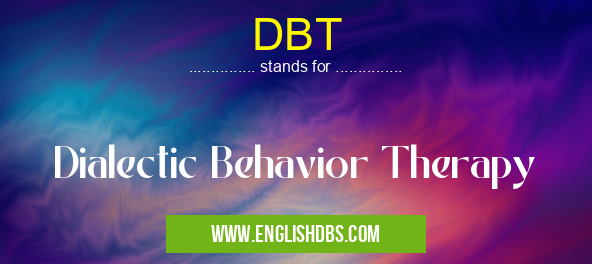What does DBT mean in THERAPY
Dialectical Behavior Therapy (DBT) is a form of psychotherapy that was initially developed to help people struggling with borderline personality disorder, but has since become widely used to treat various mental health issues, such as anxiety and depression. DBT combines cognitive behavior therapy and mindfulness techniques with an emphasis on the idea of acceptance while also recognizing the need to accept change. By teaching clients how to better regulate their emotions, manage distress, interact more effectively with others and cope in healthier ways, DBT provides individuals with powerful tools that can help them lead healthier lives.

DBT meaning in Therapy in Medical
DBT mostly used in an acronym Therapy in Category Medical that means Dialectic Behavior Therapy
Shorthand: DBT,
Full Form: Dialectic Behavior Therapy
For more information of "Dialectic Behavior Therapy", see the section below.
What Is DBT
The foundation of DBT is the concept known as “dialectical thinking†— this is when two seemingly opposing ideas are held at once without judgment or wanting one to overtake the other. This concept allows for acceptance of both black and white extremes in order to find a balanced (gray) middle ground. Through this balance, individuals can learn to accept themselves as they are while simultaneously changing unhealthy behaviors. Additionally, it emphasizes taking action towards desired goals and developing a lifestyle that maintains mental stability over time. DBT focuses heavily on skills training which consists of four main modules: emotion regulation; distress tolerance; interpersonal effectiveness; and mindfulness skills training. These practice sessions focus on teaching clients new ways of thinking and reacting which over time will eventually become automatic responses instead of requiring conscious thought or preparation. The goal then is for people to be able to live their lives in a way that brings them meaning and purpose without having to resort to unhealthy coping mechanisms and behaviors like self-harming or substance abuse.
Essential Questions and Answers on Dialectic Behavior Therapy in "MEDICAL»THERAPY"
What is Dialectic Behavior Therapy?
Dialectic Behavior Therapy (DBT) is an evidence-based psychotherapy that utilizes cognitive-behavioral techniques to help individuals better manage their emotions, establish healthier relationships and increase psychological well-being. DBT is designed to provide the skills needed to address both emotional and behavioral issues associated with mental health.
What situations might benefit from DBT?
DBT can be beneficial for individuals struggling with unmanageable overwhelming emotions, relationship issues and difficulty managing stress in their daily lives as a result of difficult past experiences. It may also be useful for people experiencing anxiety or depression who need assistance developing emotional regulation skills.
Who typically uses DBT?
DBT is utilized for those who are seeking relief from symptoms related to a variety of diagnoses such as Borderline Personality Disorder, Post Traumatic Stress Disorder, Substance Abuse Disorders, Eating Disorders and more general mood disorders. Moreover, people without a clinical diagnosis may find it helpful to learn skills related to emotional regulation.
Does DBT work for everyone?
Treatment response varies on an individual basis since each person's needs are unique. Generally speaking however, research has indicated positive outcomes from receiving DBT such as increased emotion regulation ability, improved quality of life and decreased rates of suicide attempts or hospitalization when applicable.
How long does one typically need to engage in therapy before they see results?
Although each case will differ based on the primary presenting problem(s), most individuals benefit greatly after the first several sessions by learning key coping strategies and increasing self-awareness. Longer term treatment can then build upon these initial gains while addressing any underlying contributing factors that may require further exploration in order to achieve lasting change.
Is there any homework associated with Therapies like DBT?
Yes--practicing outside of therapy session is essential for obtaining desired outcomes from engaging in treatment. During session your therapist will provide various psychoeducation techniques along with skill building exercises that are to be practiced in between sessions so that those strategies become integrated into daily life routines when appropriate.
Is DBT expensive?
While costs vary based on geographic location and type of mental health provider seen, many clinics offer services at reduced fees or on a sliding scale depending on income levels. Additionally some insurance plans provide coverage so it may be worthwhile to check ahead prior to scheduling an appointment.
Are there other types of Therapy similar to Dialectic Behavior Therapy?
Yes--other forms of Cognitive Behavioral Therapy (CBT) incorporate various techniques used by DB therapists combining talk therapy with mindfulness practice to help clients make desired changes in their thinking patterns which then leads them towards more productive behaviors. Additionally Radically Open Dialectical Behavioral Therapy (RODBT) focuses more heavily on interpersonal relationships rather than solely focusing on emotion regulation.
Does DBT take place individually or in group formats?
Both formats exist depending on the particular clinic setting independently run by mental health professionals. Individual therapy focuses specifically on working through personal goals while group settings allow participants the opportunityto gain perspectives from others in similar circumstances while also offering support resources within a safe environment
Final Words:
Overall, DBT focuses on helping people recognize what lies beneath their feelings in order for them to not just react out of habit but rather think about how best to handle situations more effectively. It teaches individuals vital skills so they can better manage their emotions when faced with difficult times, interact more successfully with others, gain self-esteem from healthy accomplishments and ultimately be happier overall in life despite the hardships thrown at them along the way.
DBT also stands for: |
|
| All stands for DBT |
